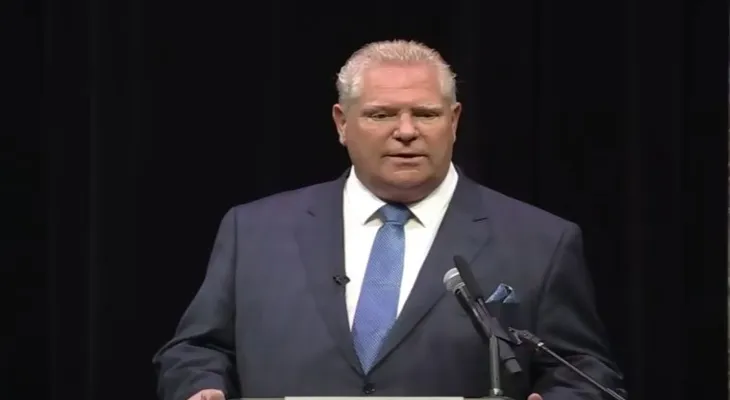Search here
Newspaper
Search here

Arab Canada News
News

Published: May 27, 2022
Doug Ford "the builder man" is the name chosen by the Premier of Ontario in a recent election debate asking the leaders of the three main parties to present their biographies.
This is the image of the Progressive Conservative Party leader that he is striving hard to present, asking voters to re-elect him as Premier.
Months ago, Ford drove his car around his neighborhood in Toronto during a snowstorm, with a small red shovel – this image spread and was mocked and criticized by some, but in the end, it speaks about Ford's approach to politics, according to Peter Graefe, a political science professor at McMaster University.
In a recent press conference, Ford said he made himself available to the media during the campaign, prioritizing meetings to embrace his party's plans to stimulate the economy.
Graefe said that Ford's direct leadership style – meeting with residents and solving problems alone – likely stems from his background as a businessman and municipal politician. Ford and his late brother, the controversial former Toronto mayor Rob Ford, emphasized "doing politics directly" when they were on city council, giving out their mobile phone numbers to anyone who wanted them and hosting backyard barbecues at the family home.
The 57-year-old father of four still presents himself as an accessible man who sends a text or phone call. Said Karl Baldauf, who worked with Ford as chief of staff at the Treasury Board until December 2020.
Baldauf, now vice president of the public affairs company McMillan Vantage, described Ford as highly sensitive to the concerns of his electoral district. He pointed out that Ford would invite him and other political staff to meet him at Perkins bakery in West Toronto for conversations about the provincial budget.
Since Ford's election in 2018, there have been no notable changes in his policies and style – including the shift from a small-government advocate eager to cut spending to a leader with the largest spending plan ever proposed in the province's history.
This change might not be significant at all, Graefe said, because Ford’s mark as a politician and his “special charisma” are strong enough with his base regardless of what he actually does.
However, Ford’s popularity declined after his government’s first budget, characterized by controversial cuts in spending on healthcare, environment, social programs, and arts, and nepotism scandals.
Ford’s opportunity to shine came in March 2020 when he emerged as the leader who had to guide people through an unprecedented crisis.
Baldauf said he saw a change around that time, describing Ford as going through a pivotal transition. He said Ford came to adopt the role of "coach" for a larger team, unlike the “isolated” way of governance when he was in municipal politics.
Ford’s handling of the pandemic drew criticism from some Ontario residents and business owners frustrated by business and school closures and social gathering restrictions in response to the pandemic. Many families called for greater accountability for those overseeing the long-term care sector, devastated by death and illness, and criticized Ford for his legislative stance they said protects companies from liability for neglect of residents.
His media appearances became sharper and less frequent as the pandemic worsened, and Graefe noted that yet, many people rallied behind him as a leader.
Graefe noted that this response was probably based on “emotion more than reason.” For example, regarding paid sick days for workers, Ford’s government had cut this program earlier in his term and delayed implementing a new program during COVID-19 before finally launching an alternative program over the course of the crisis.
One of Ford’s distinguishing features is his desire to be liked by everyone, and observers attribute this to the theme of repeated lockdowns during the pandemic when he repeatedly postponed public health measures despite warning signs, but this angered broad segments of the population when the healthcare system collapsed and lockdown became necessary.
But so far, this does not seem to affect Ford’s chances of re-election, Graefe said, with polls indicating that the Conservative Party is broadly leading, and at this stage, a majority government that the Progressive Conservatives need to remain in power seems achievable.
Ontario residents generally seem excited to see the Conservative leader, but with just over a week remaining until election day, not everyone has decided to give him their vote.
Geoffrey Lee, a college student, said Ford’s response to the pandemic could have been better, especially regarding the repeated lockdowns, and he wants to hear more from all political parties about addressing affordability.
Editing: Dima Abu Khair
Comments